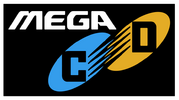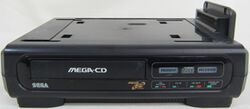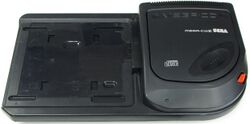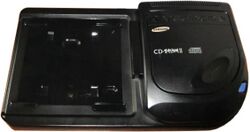Sega Mega-CD
From Sega Retro

| |||||||||||||||||||||||||||||||||||||||||||||||||||||||||||||||||||||||||||||||||||||
 
| |||||||||||||||||||||||||||||||||||||||||||||||||||||||||||||||||||||||||||||||||||||
| Sega Mega-CD | |||||||||||||||||||||||||||||||||||||||||||||||||||||||||||||||||||||||||||||||||||||
|---|---|---|---|---|---|---|---|---|---|---|---|---|---|---|---|---|---|---|---|---|---|---|---|---|---|---|---|---|---|---|---|---|---|---|---|---|---|---|---|---|---|---|---|---|---|---|---|---|---|---|---|---|---|---|---|---|---|---|---|---|---|---|---|---|---|---|---|---|---|---|---|---|---|---|---|---|---|---|---|---|---|---|---|---|---|
| Manufacturer: Sega Enterprises, Ltd. | |||||||||||||||||||||||||||||||||||||||||||||||||||||||||||||||||||||||||||||||||||||
|
The Mega-CD (メガCD), known as the Sega CD in North America and Brazil, and CD Aladdin Boy (CD 알라딘 보이) in South Korea, is a hardware add-on developed by Sega for the Mega Drive.
As the names suggest, it allows a Mega Drive to run compact discs, be it proprietary Mega-CD software, audio CDs or CD+G discs. It also acts as an upgrade to the Mega Drive hardware, sporting an extra processor and extra RAM. The Mega-CD was first released in 1991 and was supported alongside regular Mega Drive cartridges.
Contents
Hardware
The Mega-CD comes in many forms, but in all cases the hardware adds the capability of reading compact discs, technology which in the late 1980s and early 1990s, was becoming a more affordable storage option than the traditional video game ROM cartridge of previous console generations.
A traditional Mega-CD does not act as a stand-alone unit, and needs to be hooked up to a Mega Drive via the expansion port located on the right hand side of the console. Mega-CDs do, however, require their own AC adaptor, meaning that in order to play Mega-CD games, two sockets will be occupied by the upgraded console.
Though one would expect the Mega-CD to simply give the Mega Drive access to compact discs, it in fact adds extra processors, memory and audio features as well, all of which can only be utilised by CD software. The Mega-CD does not, however, solve the issue of graphics, which aside from the ability to scale and rotate sprites on the fly, remain identical to the standard Mega Drive system.
The Mega-CD also offers stereo sound RCA connectors. The Mega Drive on its own will output a monaural audio signal to the television, with stereo only being available through the headphone port located at the front of the console. An external connection from the Mega Drive to the Mega-CD will allow all games to play through the television in stereo.
The Mega-CD can be used in conjunction with a Sega 32X to run one of the six Sega Mega-CD 32X games. Alternatively it can be used to just play regular 5-inch or 3-inch audio CDs or CD+G discs. Strictly speaking the Mega-CD does not need a television to function as a CD player, as the audio can controlled with button combinations[12][13].
Models
- Main article: Mega-CD consoles.
Like the Mega Drive, there were two major revisions of the add-on by Sega and several special combination units.
Mega-CD
The original Mega-CD utilises a CD tray, and sits underneath the Mega Drive (or Mega Drive 2). It is a reasonably large add-on designed to be permanently attached to the console at all times.
Mega-CD 2
A cost-reduced model of the Mega-CD was produced and released around the same period as the cost-reduced Mega Drive 2. In Japan, the system debuted on the 23rd April, 1993[14], with a US release around Summer CES 1993 and August 1993 for Europe[15].
This version sits on the right hand side of the Mega Drive, though continues to act as a new base for the console, and is a top-loading device. Fewer mechanical parts means less is likely to go wrong with a Mega-CD 2, and is designed to look sleeker and more appealing. The Mega-CD 2 is designed primarily with the Mega Drive 2 in mind, however a plastic extension piece was included to add extra support with an original Mega Drive attached.
As part of the cost-cutting measures, only one (red) LED is used to communicate the state of the console, and the clip on the left-hand side (to keep the lead of connected headphones or speakers out of the way) has been removed (least because the redesigned Mega Drive 2 always outputs in stereo).
Mega Drive combos: JVC Wondermega/X'eye, Pioneer LaserActive, Sega Multi-Mega, and Aiwa Mega CD
- Main articles: Wondermega, LaserActive, Sega Multi-Mega, Aiwa Mega CD.
Combination Mega Drive/Mega-CD units were developed over the course of the Mega-CD's lifetime. The Wondermega and LaserActive are standalone consoles; the LaserActive also plays LaserDiscs. The Multi-Mega is a portable audio CD player that can play Mega Drive and Mega-CD games when plugged in to wall power and a TV. The Aiwa Mega CD is a Mega Drive/Mega-CD packed into Aiwa's consumer-level portable CD stereos.
Technical specifications
- Main article: Sega Mega-CD/Technical specifications.
- See also Sega Mega Drive/Technical specifications.
History
- Main article: History of the Sega Mega-CD.
Games
- Main article: Mega-CD games.
- 3 Ninjas Kick Back / Hook (1994)
- A-Rank Thunder Tanjouhen (1993)
- A/X-101 (1994)
- The Adventures of Batman & Robin (1995)
- The Adventures of Willy Beamish (1993)
- After Armageddon Gaiden: Majuu Toushouden Eclipse (1994)
- After Burner III (1992)
- Aisle Lord (1992)
- Alshark (1993)
- Android Assault: The Revenge of Bari-Arm (1993)
- Anetto Futatabi (1993)
- Arcus I-II-III (1993)
- Arslan Senki (1993)
- Bakuden Unbalance Zone (1994)
- Batman Returns (1993)
- Battlecorps (1994)
- BC Racers (1994)
- Bill Walsh College Football (1993)
- Black Hole Assault (1992)
- Bloodshot (1995)
- Bouncers (1994)
- Bram Stoker's Dracula (1993)
- Brutal: Paws of Fury (1994)
- Burai: Hachigyoku no Yuushi Densetsu (1992)
- Cadillacs and Dinosaurs: The Second Cataclysm (1994)
- Capcom no Quiz Tonosama no Yabou (1992)
- Captain Tsubasa (1994)
- Chuck Rock (1992)
- Chuck Rock II: Son of Chuck (1993)
- Cliffhanger (1993)
- Cobra Command (1992)
- Code Eliminator (2015)
- Color Mechanica (2013)
- The Colors of Modern Rock (1993)
- Compton's Interactive Encyclopedia (1994)
- Corpse Killer (1994)
- Cosmic Fantasy Stories (1992)
- Crime Patrol (1994)
- Cyborg 009 (1993)
- Daihoushinden (1995)
- Dark Wizard (1993)
- Death Bringer (1992)
- Demolition Man (1995)
- Detonator Orgun (1992)
- Devastator (1993)
- Double Switch (1993)
- Dracula Unleashed (1993)
- Dragon's Lair (1993)
- Dune (1993)
- Dungeon Explorer (1995)
- Dungeon Master II: Skullkeep (1994)
- Dynamic Country Club (1993)
- Earnest Evans (1991)
- Earthworm Jim: Special Edition (1995)
- Ecco the Dolphin (1993)
- Ecco the Dolphin CD (1995)
- Ecco: The Tides of Time (1994)
- Egawa Suguru no Super League CD (1993)
- ESPN Baseball Tonight (1994)
- ESPN National Hockey Night (1994)
- ESPN NBA Hangtime '95 (1994)
- ESPN Sunday Night NFL (?)
- Eternal Champions: Challenge From the Dark Side (1995)
- Eye of the Beholder (1994)
- F1 Circus CD (1994)
- Fahrenheit (1995)
- Fatal Fury Special (1995)
- FIFA International Soccer: Championship Edition (1994)
- Final Fight CD (1993)
- Flashback (1994)
- Flux (1996)
- Formula One World Championship: Beyond the Limit (1994)
- Gambler Jiko Chuushinha 2: Gekitou! Tokyo Mahjong Land Hen (1992)
- Game no Kanzume Vol. 1 (1994)
- Game no Kanzume Vol. 2 (1994)
- Genei Toshi (1993)
- Genghis Khan II: Clan of the Gray Wolf (1993)
- Ground Zero Texas (1993)
- Heart of the Alien: Out of this World Parts I and II (1994)
- Heavy Nova (1991)
- Heimdall (1994)
- Hook (1993)
- INXS (1993)
- Iron Helix (1994)
- Ishii Hisaichi no Daiseikai (1994)
- Jaguar XJ220 (1993)
- Jango World Cup (1993)
- Jeopardy! (1994)
- Joe Montana's NFL Football (1993)
- Jurassic Park (1993)
- Keio Flying Squadron (1993)
- Kids on Site (1994)
- Kris Kross (1992)
- The Lawnmower Man (1994)
- Lethal Enforcers (1993)
- Lethal Enforcers II: Gun Fighters (1994)
- Links: The Challenge of Golf (1994)
- Loadstar: The Legend of Tully Bodine (?)
- Lodoss-tou Senki: Eiyuu Sensou (1994)
- Lords of Thunder (1995)
- Lunar: Eternal Blue (1994)
- Lunar: The Silver Star (1992)
- Mad Dog II: The Lost Gold (1994)
- Mad Dog McCree (1993)
- Mahou no Shoujo: Silky Lip (1992)
- Marko's Magic Football (1994)
- Marky Mark and the Funky Bunch (1993)
- Mary Shelley's Frankenstein / Bram Stoker's Dracula (1994)
- The Masked Rider: Kamen Rider ZO (1994)
- Mega Schwarzschild (1993)
- MegaRace (1994)
- Mickey Mania: The Timeless Adventures of Mickey Mouse (1994)
- Microcosm (1994)
- Midnight Raiders (1994)
- Might and Magic III: Isles of Terra (1993)
- Mighty Mighty Missile! (2005)
- Mighty Morphin Power Rangers (1994)
- The Misadventures of Flink (1994)
- Mortal Kombat (?)
- My Paint: The Animated Paint Program (1994)
- NBA Jam (1994)
- NFL Football Trivia Challenge (1994)
- NFL's Greatest: San Francisco vs. Dallas 1978-1993 (1993)
- NHL Hockey '94 (1993)
- Night Striker (1993)
- Night Trap (1992)
- The Ninja Warriors (1993)
- Nobunaga no Yabou: Haouden (1994)
- Nostalgia 1907 (1991)
- Novastorm (1994)
- Panic! (1993)
- Pitfall: The Mayan Adventure (1994)
- Popful Mail (1994)
- Power Factory Featuring C+C Music Factory (1993)
- Power Monger (1994)
- Prime / Microcosm (1994)
- Prince of Persia (1992)
- Prize Fighter (1993)
- Pro Yakyuu Super League CD (1992)
- Psychic Detective Series Vol. 3: AÝA (1993)
- Psychic Detective Series Vol. 4: Orgel (1993)
- Puggsy (1993)
- Quiz Scramble Special (1992)
- Racing Aces (1993)
- Radical Rex (1994)
- Ranma ½: Byakuran Aika (1993)
- RDF: Global Conflict (1994)
- Revenge of the Ninja (1994)
- Revengers of Vengeance (1994)
- Rise of the Dragon (1992)
- Road Avenger (1992)
- Road Rash (1995)
- Robo Aleste (1992)
- Romance of the Three Kingdoms III: Dragon of Destiny (1993)
- Samurai Shodown (1995)
- The San Diego Zoo Presents... The Animals! (1994)
- The Secret of Monkey Island (2020)
- The Secret of Monkey Island (1993)
- Sega Classics Arcade Collection (1992)
- Seima Densetsu 3x3 Eyes (1993)
- Seirei Shinseiki Fhey Area (1992)
- Sengoku Denshou (1993)
- Sensible Soccer (1994)
- Sewer Shark (1992)
- Shadow of the Beast II (1994)
- Shadowrun (1996)
- Sherlock Holmes: Consulting Detective Vol. I (1992)
- Sherlock Holmes: Consulting Detective Vol. II (1993)
- Shin Megami Tensei (1994)
- Shining Force CD (1994)
- Silpheed (1993)
- SimEarth (1993)
- Slam City with Scottie Pippen (1994)
- The Smurfs (1995)
- Snatcher (1994)
- The Software Toolworks' Star Wars Chess (1994)
- Sol-Feace (1991)
- Sol-Feace / Cobra Command (1993)
- Sonic the Hedgehog CD (1993)
- Soul Star (1994)
- Space Ace (1994)
- The Space Adventure (1995)
- Spider-Man vs. The Kingpin (1993)
- Star Wars: Rebel Assault (1994)
- Star Wars: Rebel Assault (2020)
- StarBlade (1994)
- Stellar-Fire (1993)
- Supreme Warrior (1994)
- Surgical Strike (1995)
- Syndicate (1995)
- Tenbu Mega CD Special (1992)
- Tenka Fubu: Eiyuutachi no Houkou (1991)
- The Terminator (1993)
- Theme Park (1995)
- The Third World War (1993)
- Thunderhawk (1993)
- Time Gal (1992)
- Tomcat Alley (1994)
- Trivial Pursuit: Interactive Multimedia Game (1994)
- Urusei Yatsura: Dear My Friends (1994)
- Vay (1993)
- Virtual VCR (?)
- Wakusei Woodstock: Funky Horror Band (1991)
- Warau Salesman (1993)
- Wheel of Fortune (1994)
- Who Shot Johnny Rock? (1994)
- Wild Woody (1995)
- Wing Commander (1994)
- Winning Post (1993)
- Wirehead (1995)
- Wolfchild (1992)
- Wonder Dog (1992)
- Wondermega Collection (1992)
- World Cup USA 94 (1994)
- WWF Rage in the Cage (1993)
- Yumemi Mystery Mansion (1993)
- Yumimi Mix (1993)
Production credits
Japanese version
- Designer: Mega Master[16]
- Taku Matsubara[17]
- Hiroyuki Ohtaka[18]
- Masaki Kawahori[19]
- BIOS Screen Programmer: Dehehe[20]
- BIOS Screen Music Composer: Masafumi Ogata[21]
US version
- BIOS Screen (V1) Music Composer: David Javelosa[22]
- BIOS Screen (V2) Music Composer: Spencer Nilsen[23]
Magazine articles
- Main article: Sega Mega-CD/Magazine articles.
Promotional material
- Main article: Sega Mega-CD/Promotional material.
Logos by regions
| Logo | Region |
|---|---|
| Used in Japan, Asia and parts of Eastern Europe | |
| Used in North and South America | |
| Used in Western and Eastern Europe, Asia, Africa, Australasia |
Patents
External links
References
- ↑ https://sega.jp/history/hard/mega-cd/index.html (Wayback Machine: 2018-11-16 04:34)
- ↑ Beep! MegaDrive, "December 1991" (JP; 1991-11-08), page 3
- ↑ Mega Drive Fan, "February 1992" (JP; 1992-01-08), page 2
- ↑ [StarTribune_US_1992-11-12_page_6D.jpg StarTribune_US_1992-11-12_page_6D.jpg]
- ↑ https://groups.google.com/g/rec.games.video/c/XvPwfE1474Q/m/jq2meR-ZaokJ
- ↑ Sega Visions, "August/September 1992" (US; 1992-xx-xx), page 6
- ↑ 7.0 7.1 Computer & Video Games, "May 1993" (UK; 1993-04-15), page 8
- ↑ Video Game, "Outubro 1993" (BR; 1993-xx-xx), page 6
- ↑ 9.0 9.1 Mega Fun, "09/93" (DE; 1993-08-18), page 30
- ↑ Player One, "Septembre 1993" (FR; 1993-08-xx), page 53
- ↑ 11.0 11.1 Alaab Alcomputtar, "" (SA; 1995-06-xx), page 12
- ↑ Sega CD User's Manual, US; 1992, page 12
- ↑ Sega CD User's Guide, US; 1993
- ↑ http://sega.jp/fb/segahard/mcd/mcd2.html (Wayback Machine: 2016-03-03 23:30)
- ↑ Sega Force Mega, "November 1993" (UK; 1993-10-14), page 19
- ↑ Mega Drive Fan, "August 1991" (JP; 1991-07-08), page 114
- ↑ Harmony, "1994 8" (JP; 1994-08-01), page 18
- ↑ https://www.facebook.com/hiroyuki.ohtaka/about_work_and_education
- ↑ https://jglobal.jst.go.jp/detail?JGLOBAL_ID=201103088763400954
- ↑ Mega Drive Fan, "January 1992" (JP; 1991-12-07), page 93
- ↑ Sega Archives - M2 Music Memorial -
- ↑ http://javelosa.com/DJ/production.htm (Wayback Machine: 2014-11-15 06:25)
- ↑ [ ]
| Sega Mega-CD | |
|---|---|
| Topics | Technical specifications | History | Magazine articles | Promotional material |
| Hardware | Mega CD (Asia | North America | Western Europe | Eastern Europe | South America | Australasia | Africa) Sega Multi-Mega (Asia | North America | Europe | South America | Australasia) Wondermega | LaserActive | CSD-G1M |
| Misc. hardware | CD BackUp RAM Cart | Mega-CD Karaoke | Pro CDX |
| Development tools | SNASM Mega-CD | PsyQ Mega-CD SDK | PSY-Q CD Emulation System (Mega-CD) |
| Unreleased hardware | Game Genie |
| Sega Home Video Game Systems | ||||||||||||||||||||||||||||
| 83 | 84 | 85 | 86 | 87 | 88 | 89 | 90 | 91 | 92 | 93 | 94 | 95 | 96 | 97 | 98 | 99 | 00 | 01 | 02 | 03 | 04 | 05 | 06 | 07 | 08 | 09 | 10 | 11 |
|---|---|---|---|---|---|---|---|---|---|---|---|---|---|---|---|---|---|---|---|---|---|---|---|---|---|---|---|---|
| SG-1000 | SG-1000 II | Mega Drive | Mega Drive II | |||||||||||||||||||||||||
| SC-3000 | Mega-CD | Mega-CD II | Genesis 3 | |||||||||||||||||||||||||
| Sega Mark III | 32X | Dreamcast | ||||||||||||||||||||||||||
| Master System | Master System II | |||||||||||||||||||||||||||
| AI Computer | Game Gear | |||||||||||||||||||||||||||
| Saturn | ||||||||||||||||||||||||||||
| Pico | Beena | |||||||||||||||||||||||||||
- JP Mega-CD hardware
- External JPEG reference
- US Mega-CD hardware
- DE Mega-CD hardware
- ES Mega-CD hardware
- FR Mega-CD hardware
- UK Mega-CD hardware
- SI Mega-CD hardware
- SE Mega-CD hardware
- IT Mega-CD hardware
- AU Mega-CD hardware
- BR Mega-CD hardware
- KR Mega-CD hardware
- RU Mega-CD hardware
- SA Mega-CD hardware
- TW Mega-CD hardware
- AS Mega-CD hardware
- Mega-CD hardware
- Credits without reference
- Sega Mega-CD




















